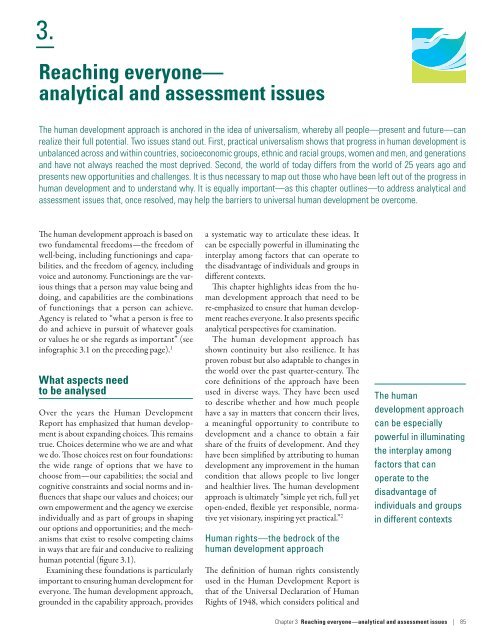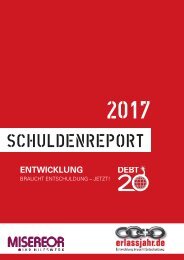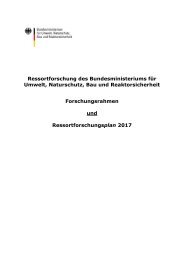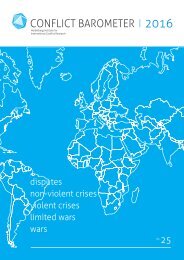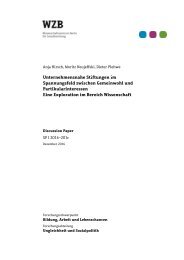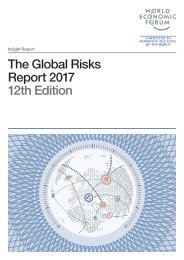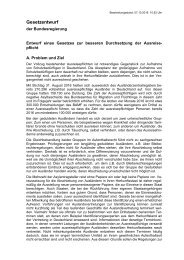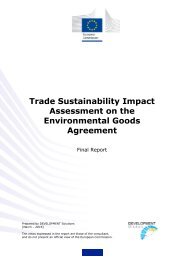Human Development Report 2016
6Tyccfrzw
6Tyccfrzw
Create successful ePaper yourself
Turn your PDF publications into a flip-book with our unique Google optimized e-Paper software.
<strong>Human</strong> <strong>Development</strong><br />
3.<br />
<strong>Report</strong> <strong>2016</strong><br />
<strong>Human</strong> <strong>Development</strong> for Everyone<br />
Reaching everyone —<br />
analytical and assessment issues<br />
The human development approach is anchored in the idea of universalism, whereby all people — present and future — can<br />
realize their full potential. Two issues stand out. First, practical universalism shows that progress in human development is<br />
unbalanced across and within countries, socioeconomic groups, ethnic and racial groups, women and men, and generations<br />
and have not always reached the most deprived. Second, the world of today differs from the world of 25 years ago and<br />
presents new opportunities and challenges. It is thus necessary to map out those who have been left out of the progress in<br />
human development and to understand why. It is equally important — as this chapter outlines — to address analytical and<br />
assessment issues that, once resolved, may help the barriers to universal human development be overcome.<br />
The human development approach is based on<br />
two fundamental freedoms — the freedom of<br />
well-being, including functionings and capabilities,<br />
and the freedom of agency, including<br />
voice and autonomy. Functionings are the various<br />
things that a person may value being and<br />
doing, and capabilities are the combinations<br />
of functionings that a person can achieve.<br />
Agency is related to “what a person is free to<br />
do and achieve in pursuit of whatever goals<br />
or values he or she regards as important” (see<br />
infographic 3.1 on the preceding page). 1<br />
What aspects need<br />
to be analysed<br />
Over the years the <strong>Human</strong> <strong>Development</strong><br />
<strong>Report</strong> has emphasized that human development<br />
is about expanding choices. This remains<br />
true. Choices determine who we are and what<br />
we do. Those choices rest on four foundations:<br />
the wide range of options that we have to<br />
choose from — our capabilities; the social and<br />
cognitive constraints and social norms and influences<br />
that shape our values and choices; our<br />
own empowerment and the agency we exercise<br />
individually and as part of groups in shaping<br />
our options and opportunities; and the mechanisms<br />
that exist to resolve competing claims<br />
in ways that are fair and conducive to realizing<br />
human potential (figure 3.1).<br />
Examining these foundations is particularly<br />
important to ensuring human development for<br />
everyone. The human development approach,<br />
grounded in the capability approach, provides<br />
a systematic way to articulate these ideas. It<br />
can be especially powerful in illuminating the<br />
interplay among factors that can operate to<br />
the disadvantage of individuals and groups in<br />
different contexts.<br />
This chapter highlights ideas from the human<br />
development approach that need to be<br />
re-emphasized to ensure that human development<br />
reaches everyone. It also presents specific<br />
analytical perspectives for examination.<br />
The human development approach has<br />
shown continuity but also resilience. It has<br />
proven robust but also adaptable to changes in<br />
the world over the past quarter-century. The<br />
core definitions of the approach have been<br />
used in diverse ways. They have been used<br />
to describe whether and how much people<br />
have a say in matters that concern their lives,<br />
a meaningful opportunity to contribute to<br />
development and a chance to obtain a fair<br />
share of the fruits of development. And they<br />
have been simplified by attributing to human<br />
development any improvement in the human<br />
condition that allows people to live longer<br />
and healthier lives. The human development<br />
approach is ultimately “simple yet rich, full yet<br />
open-ended, flexible yet responsible, normative<br />
yet visionary, inspiring yet practical.” 2<br />
<strong>Human</strong> rights — the bedrock of the<br />
human development approach<br />
The definition of human rights consistently<br />
used in the <strong>Human</strong> <strong>Development</strong> <strong>Report</strong> is<br />
that of the Universal Declaration of <strong>Human</strong><br />
Rights of 1948, which considers political and<br />
The human<br />
development approach<br />
can be especially<br />
powerful in illuminating<br />
the interplay among<br />
factors that can<br />
operate to the<br />
disadvantage of<br />
individuals and groups<br />
in different contexts<br />
Chapter 3 Reaching everyone — analytical and assessment issues | 85


